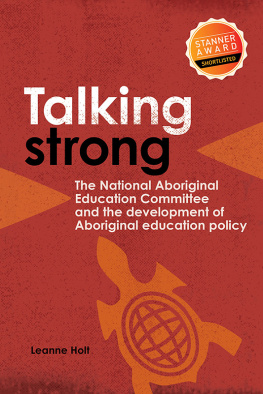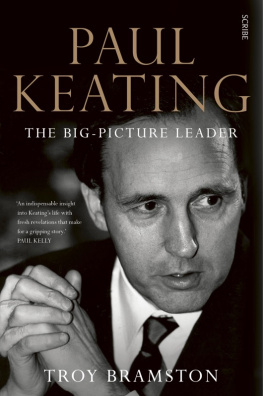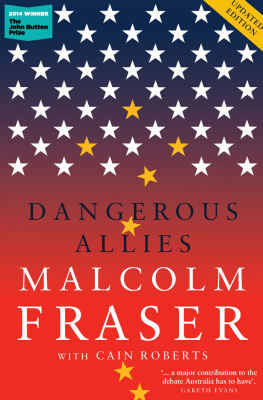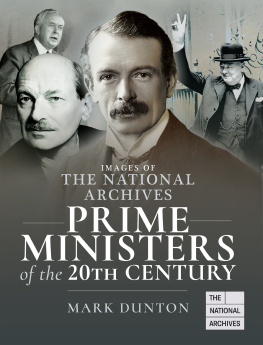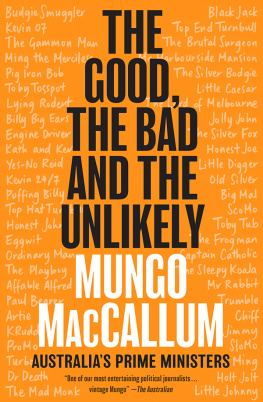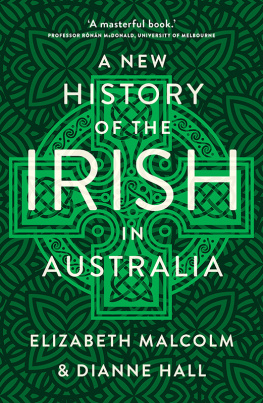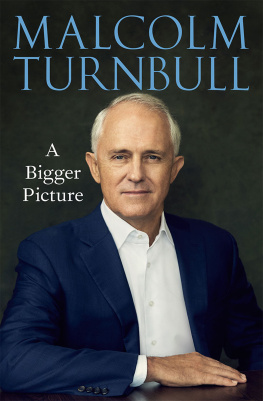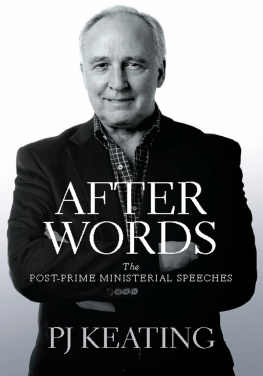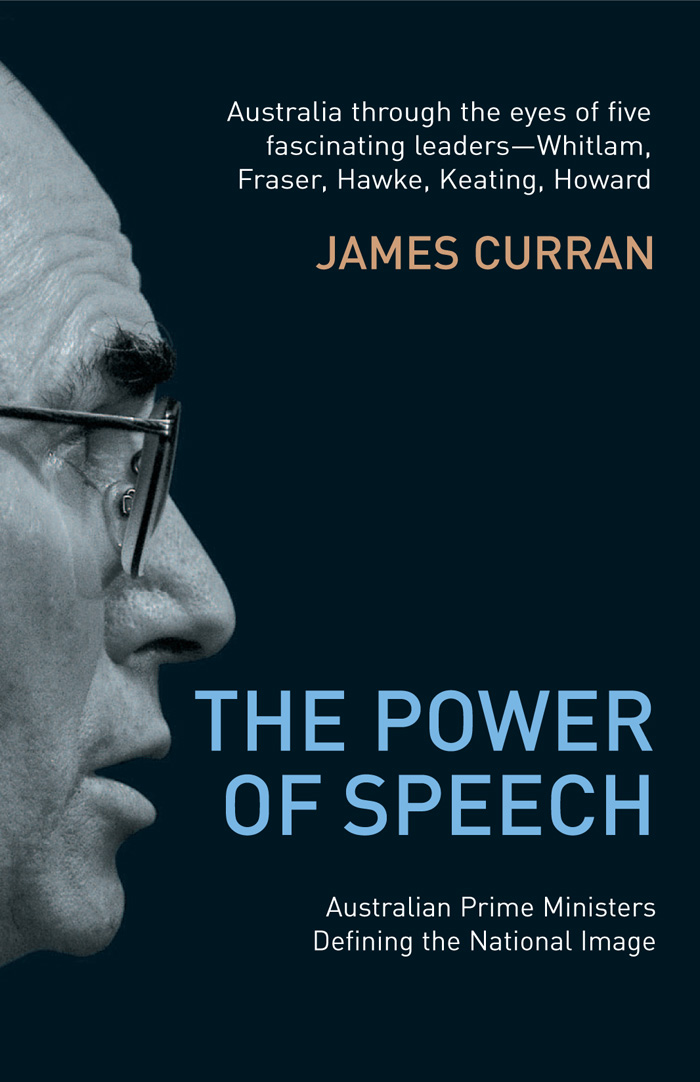This makes for good reading: political history as told by the politicians.
Canberra Times
An important, intriguing book that demonstrates how politicians have wrestled with the idea of what makes an Australian and how we should relate to the world since the 1940s... Curran is a subtle thinker who has distilled meaning from a mass of documents and has demonstrated how Australias leaders have struggled to define a sense of national identity... this book will appeal to anybody who understands that ideas are the raw material of politics.
Weekend Australian
This book is a rare and welcome beast: a work of scholarship that is eminently and compellingly readable... Given the inescapable permanence of a societys need to understand itself, it is surprising that James Currans study is the first of its kind in this country. It is a solid and engaging foundation for more of the same.
The Adelaide Review
THE POWER
OF SPEECH
THE POWER
OF SPEECH
Australian Prime Ministers
defining the national image
JAMES CURRAN

MELBOURNE UNIVERSITY PRESS
An imprint of Melbourne University Publishing Ltd
PO Box 1167, Carlton, Victoria 3053 Australia
mup-info@unimelb.edu.au
www.mup.com.au
First published 2004
Reprinted 2005
This edition 2006
Text James Curran 2004
Design and typography Melbourne University
Publishing Ltd 2004
Designed by Phil Campbell
Typeset in New Baskerville 9.75/12.5 point
by Syarikat Seng Teik Sdn. Bhd., Malaysia
Printed in Australia by McPhersons Printing Group
This book is copyright. Apart from any use permitted under the Copyright Act 1968 and subsequent amendments, no part may be reproduced, stored in a retrieval system or transmitted by any means or process whatsoever without the prior written permission of the publishers.
National Library of Australia Cataloguing-in-Publication entry
Curran, James, 1973 .
The power of speech: Australian Prime Ministers defining the national image.
New ed.
Bibliography.
Includes index.
ISBN 9 78052285 2486.
ISBN 0 522 85248 3.
1. NationalismAustralia. 2. Prime ministersAustralia.
3. Political oratoryAustralia. I. Title.
320.540994
The publication of this work has been supported by subsidies from the Australian Academy of the Humanities, the John Curtin Prime Ministerial Library and the Bob Hawke Prime Ministerial Library.

Consider how the historian describes a famous speech. He does not concern himself with any sensuous elements in it such as the pitch of the statesmans voice, the hardness of the benches, the deafness of the old gentleman in the third row; he concentrates his attention on what the man was trying to say (the thought, that is, expressed in his words) and how his audience received it (the thoughts in their minds, and how these conditioned the impact upon them of the statesmans thought).
R G C OLLINGWOOD , An Autobiography, 1938
Our art and our great literary works resound with the echoes of history, our men of action have its lessons, real or pretended, incessantly on their lips...
M ARC B LOCH , The Historians Craft, 1941
FOR PRISCILLA AND PIA
CONTENTS
Jolted by Events to Adulthood:
Prime Ministers and the British myth in
a changing world, 19411972
The Verdant Vista of the New:
Gough Whitlam and the new nationalism
Challenge and Response: Malcolm Fraser,
Australia and the world, 19481983
A Desire for Harmony: Bob Hawke and
consensus
Aggressive Australianism: Paul Keating,
radical nationalist prime minister
The Last Word?: John Howard and the end
of the identity crisis
ACKNOWLEDGEMENTS
I N HIS AUTOBIOGRAPHY , historian R. G. Collingwood observed that work ceases upon... the manuscript, not because it is finished, but because sending-in day is at hand, or because the printer is clamorous for copy. I thank all those who have assisted me in reaching sending-in day with this book. In particular, I thank Neville Meaney for the privilege of sharing in the wealth of his scholarship and for his valuable guidance during the course of my postgraduate research. Those familiar with Neville Meaneys contribution to the study of Australias relations with the world and ideas of nationalism will recognise his influence on this book. For their insightful and probing comments offered on the manuscript I would also like to thank Paul Kelly, Carl Bridge and Brian Fletcher, as well as Stuart Ward, Matt Jordan, Eddy Kim, Tom Switzer, Mark McKenna, and Richard Lehane. Gray Connolly was a constant source of stimulating debate. Naturally, the books shortcomings are mine and mine alone.
The Hon Gough Whitlam QC AC graciously gave me his permission to reproduce two of his early poetical works, whilst the National Archives of Australia, the Australian War Memorial, the Prime Ministers Office, The Canberra Times and the Bob Hawke Prime Ministerial Library were kind enough to permit the reproduction in this book of various photographs from their respective collections.
The staff of the Fisher, Auchmuty, Mitchell and National libraries, as well as archivists at the National Archives of Australia, were ever willing and helpful. The late Tony Cahill kindly gave me many fine volumes and journals from his library which greatly assisted with my research. In Sydney Elwyn, Silvana and Denise Elms provided me with a home away from home and I thank them for their great warmth and endless generosity. On research trips to Canberra I was always the recipient of the magnificent hospitality of Paul and Janice Curran and family.
From Melbourne University Publishing I received sustained support and enthusiasm. Sybil Nolan engaged with the work, tested its arguments and proferred sage advice for changes and additions. Sally Moss was a meticulous but merciful copy-editor. The publication of this work has been assisted by publication grants from the Australian Academy of the Humanities, the Bob Hawke Prime Ministerial Library and the John Curtin Prime Ministerial Library. For this support, I am grateful especially to Kandy-Jane Henderson, Jenni Jeremy, Dr Alan Bundy and Dr Lawrence Warner.
Finally, I thank my parents, Jeannie Addison and Bernard Curran, who sowed the seeds of my historical interests and continue to nourish them. Most of all, I would like to thank my wife Priscilla, whose faith in me ensured the completion of this work, and my daughter Pia, who, in a much more profound way, is also coming to know the power of speech. I dedicate this book to them.
James Curran
Canberra, January 2004
FOREWORD
T HIS IS AN IMPORTANT and timely analysis of how Australias prime ministers in the post-1960s period have tried to articulate a new sense of Australian identity. Its entry point is the demise in that decade of the shared Australian-British nationalism based on cultural and racial unity. The collapse of the idea of Britishness in Australia was an epic event, as James Curran argues in his introduction. It left a political void or as Curran says a crisis of national meaning. This book documents the subsequent effort of each prime minister from Gough Whitlam to John Howard to fill the void and represent the evolving notion of national identity.


